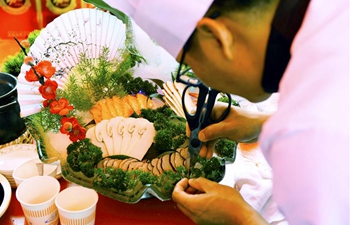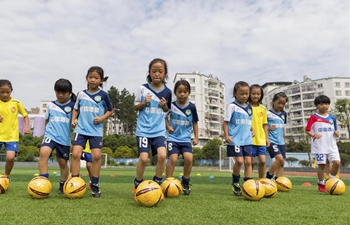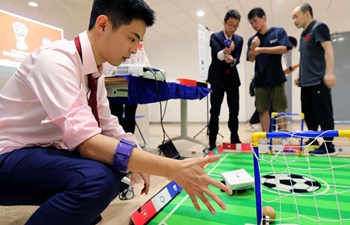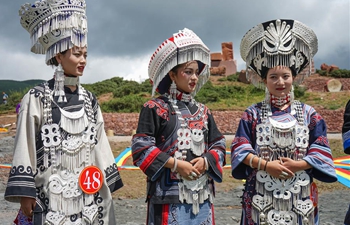CHENGDU, Aug. 9 (Xinhua) -- With tea, honey, and passion fruit juice mixed with Chinese liquor, a delicious cocktail is made.
The cocktail is made by Zeng Na, 38, a liquor-tasting master and practitioner of traditional liquor-making techniques at Luzhou Laojiao, a Chinese liquor company in the city of Luzhou, southwest China's Sichuan Province.
"I think liquor-tasting and dancing have something in common. Dancing is an art on the tip of your toes, and liquor-tasting is an art on the tip of your tongue. They both pursue harmony and beauty," she said.
In 1998, she started to learn about the art of liquor-tasting. Things were tough in the beginning as she had to train and develop the sensitivity of her sense of smell and taste.
"There would be several cups of liquid in front of you. They looked the same as water and were diluted, but you had to tell what the flavor was and the differences between them," she said. "I did this from day to night, and for many times, my tongue would often get swollen."
Years later, as an experienced liquor-tasting master, her job is no easier. "I have to taste 100 to 200 liquor samples when I am busy. And when tasting, I have to be very concentrated. So when the day is over, I feel exhausted," she said.
Zeng also has to avoid spicy food, but as a local who grew up in Sichuan, it is one of her favorites. She is not able to wear make-up or perfume either and has to use shampoo without fragrance.
"When I started to learn liquor-tasting, I was very curious, but then at a certain stage, I felt so tired," she said. "But now, I know what my responsibility is, and I want to work hard to innovate."
In recent years, Zeng and her colleagues have been working hard to produce new products. They have developed nutritious liquor for elders, and cocktails for young people. "We select natural ingredients and mix them with liquor. For example, we make smoothies with lichi and liquor in the summer, and a hot drink with tea and liquor in the winter."
Moreover, Zeng and her colleagues have created operas and dance dramas that incorporate liquor-mixing techniques to help show Chinese liquor culture.
"China has such a long history of liquor-making and a rich liquor culture," she said. "I hope the new products and performances can help more people, both home and abroad, to learn about Chinese liquor, and hopefully fall in love with it just as I did."
"We need innovative efforts to pass on China's liquor-making techniques and liquor culture. It's important that we teach liquor-making techniques to the next generation," she said.

















